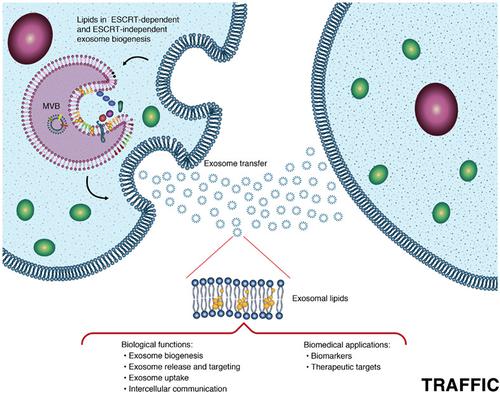Our official English website, www.x-mol.net, welcomes your
feedback! (Note: you will need to create a separate account there.)
The role of lipids in exosome biology and intercellular communication: Function, analytics and applications
Traffic ( IF 3.6 ) Pub Date : 2021-05-30 , DOI: 10.1111/tra.12803 Javier Donoso-Quezada 1 , Sergio Ayala-Mar 1 , José González-Valdez 1
Traffic ( IF 3.6 ) Pub Date : 2021-05-30 , DOI: 10.1111/tra.12803 Javier Donoso-Quezada 1 , Sergio Ayala-Mar 1 , José González-Valdez 1
Affiliation

|
Exosomes are extracellular vesicles that in recent years have received special attention for their regulatory functions in numerous biological processes. Recent evidence suggests a correlation between the composition of exosomes in body fluids and the progression of some disorders, such as cancer, diabetes and neurodegenerative diseases. In consequence, numerous studies have been performed to evaluate the composition of these vesicles, aiming to develop new biomarkers for diagnosis and to find novel therapeutic targets. On their part, lipids represent one of the most important components of exosomes, with important structural and regulatory functions during exosome biogenesis, release, targeting and cellular uptake. Therefore, exosome lipidomics has emerged as an innovative discipline for the discovery of novel lipid species with biomedical applications. This review summarizes the current knowledge about exosome lipids and their roles in exosome biology and intercellular communication. Furthermore, it presents the state-of-the-art analytical procedures used in exosome lipidomics while emphasizing how this emerging discipline is providing new insights for future applications of exosome lipids in biomedicine.
中文翻译:

脂质在外泌体生物学和细胞间通讯中的作用:功能、分析和应用
外泌体是一种细胞外囊泡,近年来因其在许多生物过程中的调节功能而受到特别关注。最近的证据表明,体液中外泌体的成分与癌症、糖尿病和神经退行性疾病等某些疾病的进展之间存在相关性。因此,人们进行了大量的研究来评估这些囊泡的组成,旨在开发新的诊断生物标志物并寻找新的治疗靶点。就脂质而言,脂质是外泌体最重要的成分之一,在外泌体生物发生、释放、靶向和细胞摄取过程中具有重要的结构和调节功能。因此,外泌体脂质组学已成为发现具有生物医学应用的新型脂质种类的创新学科。这篇综述总结了当前关于外泌体脂质及其在外泌体生物学和细胞间通讯中的作用的知识。此外,它介绍了外泌体脂质组学中使用的最先进的分析程序,同时强调这一新兴学科如何为外泌体脂质在生物医学中的未来应用提供新的见解。
更新日期:2021-06-28
中文翻译:

脂质在外泌体生物学和细胞间通讯中的作用:功能、分析和应用
外泌体是一种细胞外囊泡,近年来因其在许多生物过程中的调节功能而受到特别关注。最近的证据表明,体液中外泌体的成分与癌症、糖尿病和神经退行性疾病等某些疾病的进展之间存在相关性。因此,人们进行了大量的研究来评估这些囊泡的组成,旨在开发新的诊断生物标志物并寻找新的治疗靶点。就脂质而言,脂质是外泌体最重要的成分之一,在外泌体生物发生、释放、靶向和细胞摄取过程中具有重要的结构和调节功能。因此,外泌体脂质组学已成为发现具有生物医学应用的新型脂质种类的创新学科。这篇综述总结了当前关于外泌体脂质及其在外泌体生物学和细胞间通讯中的作用的知识。此外,它介绍了外泌体脂质组学中使用的最先进的分析程序,同时强调这一新兴学科如何为外泌体脂质在生物医学中的未来应用提供新的见解。











































 京公网安备 11010802027423号
京公网安备 11010802027423号